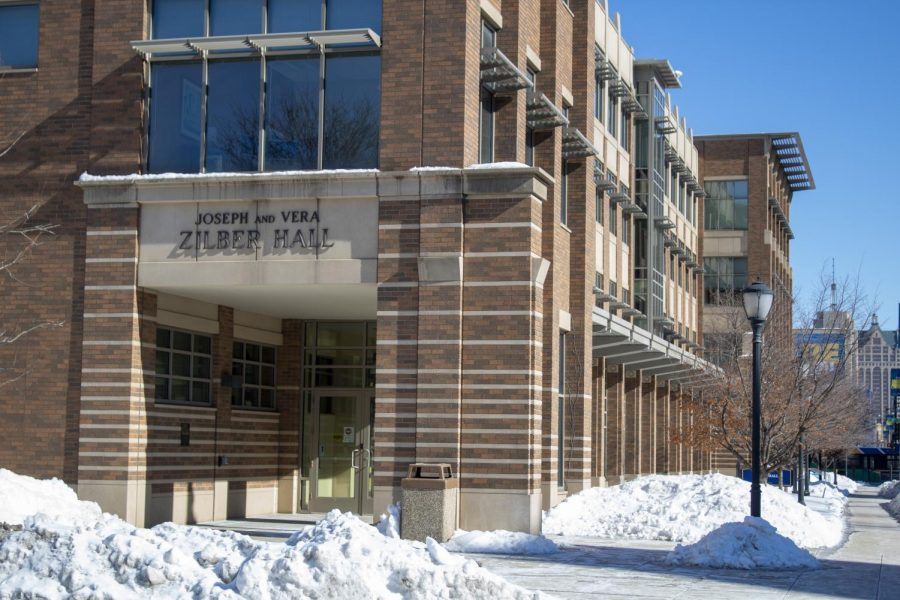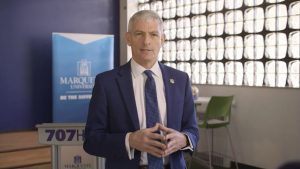While Marquette University continued to make decisions about the university, students, faculty and staff were again left in the dark, only to find out about these updates last week.
The university’s updates on mitigating the spread of COVID-19 on campus or recent lay offs of 39 staff members were not discussed in University President Michael Lovell’s seventh annual presidential address Feb. 4.
Lovell announced that the administration has been working with Black Student Council in order to follow through with its promises made over the summer to prioritize Black students’ success on campus. He said Marquette is increasing urban scholarships by 40, making significant changes to the core curriculum to address racism and racial inequality, launching a fundraising campaign for scholarships and housing funds and implementing an online training for faculty and staff on diversity and implicit bias.
Additionally, Lovell said a Black cultural center opened up in Humphrey Hall at the beginning of the spring semester and the Committee for Black Student Initiatives was formed. The university is also in the process of hiring a director of Black Student Initiatives and will be opening up a Living Learning Community for Black students, which will be named after Jacqueline Walker, a long-time Education Opportunity Program staff member who passed away last summer.
The university should be acknowledged for making more initiatives to support Black students and address racial injustice on campus.
Lovell said that another area Marquette aims to focus on this year is prioritizing students’ success through the Student Success Initiative. According to university data, he said Marquette only graduates 1,600 students out of a traditional class of 2,000, and that those not completing graduation are disproportionately first-generation students and recipients of the Pell Grant which is awarded to students in financial need.
Specific goals for this initiative include increasing four-year graduation rates, decreasing student debt, creating a Student Success Lab that will integrate curricular, co-curricular and academic services and implementing a holistic strategy to give individualized support to students.
While Lovell should be acknowledged for wanting to support students’ success, he has been largely absent from campus this year and has had little connection and communication with students, which may make it difficult for students to believe the university has their best interest in mind. Even though face-to-face interactions are most likely to be limited due to the COVID-19 pandemic, the majority of emails sent to students have been from other university leaders like vice president of student affairs Xavier Cole.
Additionally, attendees are usually given time to ask questions after Lovell delivers his presidential address, but this year’s online format did not allow for any dialogue. This eliminated the opportunity for students, faculty and staff to ask Lovell questions about new plans for the university.
Lovell also mentioned that over the past year, Marquette has raised over $48 million from donors, and over the past two fiscal years, Marquette has raised over $200 million. He also announced that this April the university will be launching its largest fundraising campaign in Marquette’s history. Despite this progress, Lovell did not say how that money would be allocated.
Additionally, the university is expected to receive $9.7 million in federal relief funds from the Coronavirus Response and Relief Supplemental Appropriations Act, according to a Jan. 28 university news release. Of those funds, $3.3 million will go towards supporting students, leaving approximately $6.4 million. Lovell did not discuss how the university plans to spend those funds.
He also did not address the university’s recent decision to lay off 39 staff members, or discuss future budget plans for the 2022 fiscal year to lay off 225 more positions at his address Thursday, although he has addressed those issues in previous communication with the campus community. Even though the university plans to launch its largest fundraising campaign over, received over $48 million from donors and is expected to receive federal funding relief, Lovell did not say that any of this money would go towards maintaining faculty and staff positions.
In 2021, Lovell should make deliberate efforts to maintain connections with students and the university must be more transparent about its decisions and make sure that students, faculty and staff members’ voices are included because the vision and future of Marquette should not be dictated by an exclusive few.
Correction: A previous version of this editorial incorrectly stated “layoffs of 39 faculty and staff members.” In a letter from President Lovell in the Jan. 22 Marquette Today, it stated “39 of our staff colleagues have been notified this week that their positions with Marquette have been eliminated.” The letter went onto address that the actions taken “do not involve any tenured or tenure-track faculty losing their positions.” Though no mention of non-tenure track faculty positions within the letter, the Office of Marketing and Communication later clarified that the layoffs only affected staff members and not non-tenured track faculty. The story has been updated to correctly state that 39 staff members have been laid off.
Additionally, a previous version of this editorial said Lovell did “not address the university’s recent decision to lay off 39 staff members, or discuss future budget plans for the 2022 fiscal year to lay off 225 more positions.” We intended to state that Lovell did not address those topics in his address Thursday. Lovell has addressed the future budget plans and positions prior to his address.
The Wire regrets these errors.
Editorial topics by the Marquette Wire are decided at weekly meetings between members of the executive board. The editorial is crafted with leadership by the executive opinions editor. The executive board consists of the executive director of the Wire, managing editor of the Marquette Tribune, managing editor of the Marquette Journal, general manager of MUTV, general manager of MUR and nine additional top editors across the organization.












